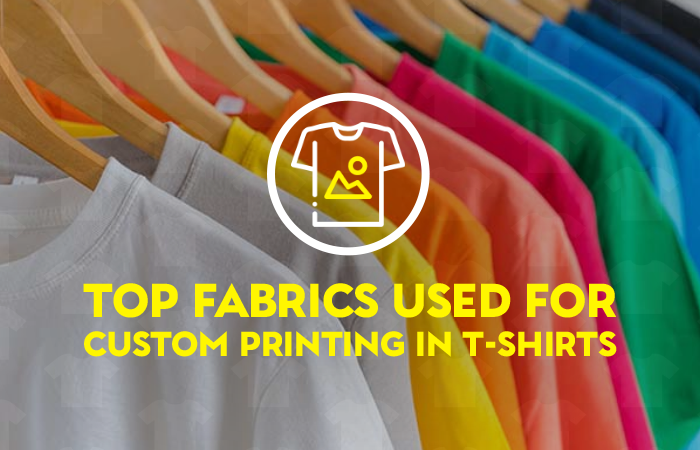When it comes to printing on t-shirts, there are a variety of fabrics that can be used. So, whether you are looking to order custom printed t-shirts for your business or a special event, you need to know about the most popular fabrics for printing, its benefits and drawbacks.
If you wish to know more about the best fabrics for custom printing, here is the information.
1. Cotton
Cotton is the most popular fabric, and for a good reason. It is soft, durable, and breathable, making it perfect for everyday wear. Cotton t-shirts can also be screen printed or embroidered quickly, making them a popular choice for corporate uniforms and promotional giveaways.
The only disadvantage is that it can become quite heavy when wet. So, if you are looking for a fabric that will dry quickly, cotton may not be the best option.
Some popular types of cotton used for garments are:
- Pima Cotton: This type of cotton is extra soft and durable. It is often used in high-end t-shirt printing.
- Organic Cotton: This type of cotton is grown without pesticides or other harmful chemicals. It is a good choice for those looking for an eco-friendly option.
2. Polyester
Polyester is a fabric known for being strong, durable, and wrinkle-resistant. It is also resistant to shrinking and fading, making it a popular choice for custom printed t-shirts. Polyester is a synthetic fabric, so it does not breathe like natural fabrics like cotton. This means that it can be a less comfortable option in hot weather.
Polyester is often combined with other fabrics to create a more breathable shirt. Polyester blends are standard in sportswear and activewear because they wick moisture away from the body, keeping you cool and dry.
Polyester is a good choice if you are looking for a fabric that will hold up to repeated washings and wearings.
3. Spandex
Spandex is a synthetic fiber known for its exceptional elasticity. It is often used in sportswear because it allows maximum freedom of movement while still providing support. The global spandex market size was $7.39 billion in 2019.
Spandex is also moisture-wicking, so it helps keep you cool and dry during intense physical activity. When combined with other fabrics, spandex can add stretch and durability.
It is an ideal fabric for custom printing because it allows the ink to bond with the fibers, resulting in a long-lasting print. The material is also easy to care for. Do machine washes in cold water and tumbles dry on low heat.
4. Bamboo
Bamboo is a popular fabric choice for custom printing in t-shirts. It is soft, comfortable, and has a natural sheen that looks elegant. Bamboo also has antibacterial properties, making it a good choice for activewear or everyday wear.
Being a natural fabric that is soft and comfortable, bamboo is a great choice. It has a beautiful sheen, and its antibacterial properties make it perfect for activewear or everyday wear.
5. Rayon
Rayon is a synthetic fabric that is made from wood pulp. It is very absorbent, so it is often used in sportswear and other garments that need to wick away sweat. Rayon is also very breathable, making it a good choice for hot weather. However, rayon is not as durable as other fabrics, so it might not be the best choice for an everyday shirt.
6. Modal
Modal is a fabric that is made from beechwood pulp. It is a semi-synthetic fabric, meaning it is not entirely natural and not quite synthetic. Modal is very soft and has a silky feel, making it a popular choice for t-shirts. It is also known for being durable and shrink resistant. Modal can be more expensive than other fabrics, but it is worth the investment if you look for a high-quality t-shirt.
Lenzing Modal is a brand of modal fabric made from sustainably-sourced beechwood pulp. The material is produced using certified sustainable methods like wind power and solar energy.
It is also durable and resistant to shrinkage, making it a good choice for t-shirts that you plan to wear often.
7. Hemp
Hemp t-shirts are perfect for looking for a more sustainable option. A natural fiber, hemp is one of the most robust and durable plant-based fabrics. It is also environmentally friendly because it needs little water to grow.
8. Conclusion
Choosing the suitable fabric is an integral part of the garment printing process. The type of fabric you select will affect the quality of your print, the durability of your shirt, and the overall look and feel of your design.
Jessika Perkins
Latest posts by Jessika Perkins (see all)
- Sentimental Mother’s Day Gifts from Daughters You Can Buy - May 5, 2023
- How to Shrink a Hoodie? - January 31, 2023
- Reasons to consider Tailored Clothes this Fall - December 8, 2022
